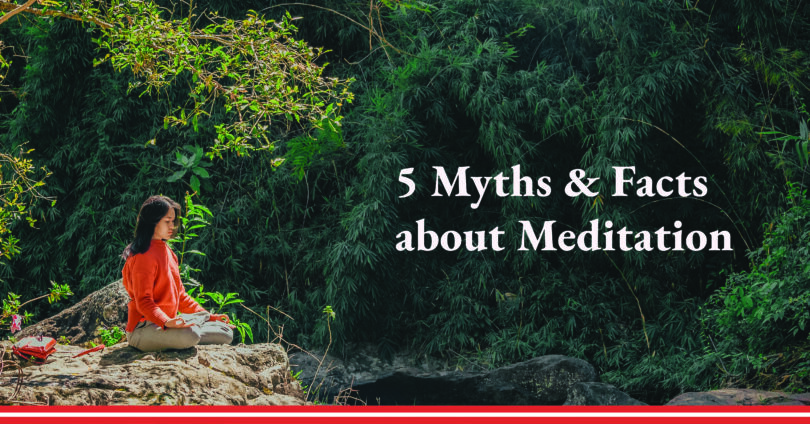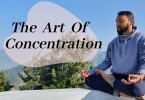Yoga as a holistic practice consists of not just Asana practice but also Shatkarma (Purification techniques), Pranayama (Breathing exercises), Dharna (Concentration), Dhyan (Meditation), Yama and Niyama (ethics and morals) etc.
Dhyan is a Sanskrit word which translates to ‘meditate.’ The word meditation comes from a latin word “meditari’, which means ‘to think or contemplate.’ Although Dhyan as a practice is much more than just thinking, contemplating or fantasising.
Read the article on what is meditation and what is not?
Over the years many speculations and assumptions have arose due to the popularity of Yoga. People practice Dhyan (Meditation) but they are not able to bear its fruits as the true meaning of Meditation is unknown to many or because of lot of myths on meditation. These myths on meditation creates a cycle of miscommunication being passed on from one to the other.
Here in this article I am going to take top 5 myths on Meditation and its practice bursting facts which I can across while practicing and teaching meditation.
Myth – 1 “Not everybody can meditate.”
Hmmm…… it not really true (this is one of the most common from myths on meditation). But yes can not deny the fact it hard in the beginning (well everything is hard in the beginning). With the right understanding and approach people with severe health conditions also can practice meditation.
There are different techniques to practice meditation. Every person can find the suitable way for him/her to meditate, be it seated, reclined, walking, guided etc. Breath is a guide for meditation practices for beginners, as it allows you to focus and flow with it. This practice can lead to the habit of observing instead of reacting, and that is known to be beneficial for a balanced life.
Myth – 2 “I have tried meditation but it didn’t work with me.”
Meditation is not a pill that will bring results after the 1st use. The results of the practice are increased analogically with the amount of time that someone is investing in, the consistency, the quality and the intention.
It might bring the practitioner closer to his/her suppressed thoughts or closer to the “truth” that lives in every one and in everything. Then can provoke a huge discomfort, since the modern lifestyle is designed to do the exact opposite (With distractions) and also the individual needs to take actions and change things. Apart from that the practice of meditation is based in the concept of creating new habits, new connections in the human brain. For that consistency, determination, discipline are needed.
Myth – 3 “It will help people who suffer from long term depression or severe anxiety.”
Remember meditation is a powerful tool, but also not an instant cure for everything.
It is a state of continuous awareness of an object which can only be achieved through the Art of Concentration. This is also a great myth among the myths on meditation.
In commentary of Yoga Sutra of Patanjali, Ved Vyasa talks about five stages of mind. Kshipt (restless mind) & Mudha (repetitive thoughts) two stages are correlated to depression and anxiety (also known as lower ground of mind). People who find themselves in one of these two stages of mind, need to seek out a professional help before they might be able to benefit from meditation practice. This help can look like talking to a therapist or even taking medication.
While they start working on themselves and face their personal issues, they will eventually enter the common ground of the mind, which is called Vikshipat. This allows them to benefit from meditation and also other yogic techniques like Pranayama or Asana practice. There will always be exceptions to this rule, but generally speaking it will be hard for people with those two conditions to indulge into the practice of meditation.
Myth – 4 “Meditation is having no thoughts – it is about cleaning your mind.”
While many people believe in the misconception that meditation is all about emptying the mind, it is actually quite the opposite. Meditation is a mindful practice to train awareness and attention. This can be achieved through the practice of observation, but also with other techniques. We practice to watch the activity of our mind without reacting (without entertaining them) to anything which is on-going.
In other words: Meditation is about watching thoughts passing by like clouds so we can achieve a deeper awareness about who we are and what our thoughts are. But there are also many other meditation techniques like Mantra chanting, Trataka (gazing the flame), introspection, concentration or stillness practice. These techniques can enhance general well-being and also enable us to respond rather than react to our emotions and also triggers from the outside world.
Myth – 5 “Meditation is complicated, hard and takes a lot of time. So people say something like “
I cannot do it. Or This is just not for me. OR I cannot sit for a long time with crossed legs.”
Common arguments to start with for meditation are ‘that it is too hard,’ ‘takes too much time. While it is true that the first attempts with meditation might not
be easy, the practice offers benefits to all practitioners plus to begin with, a thin cushion/bolster underneath the bottoms is helpful.
There is no need to start with a long practice, even a short meditation gives equal benefits. Five minutes a day can also make a difference. In the beginning Pranayama works magnificently.
It is all about achieving a position in which we can focus on the practice itself to calm the mind – no matter how we start. Meditation does not have to be hard – there are so many different techniques to suit various individuals. A guided mediation might be helpful for the start as well as a dynamic meditation might be beneficial for those who are struggling to sit still for a specific period of time. It is all about the journey that will automatically unfold if the practice is done on a regular basis.







